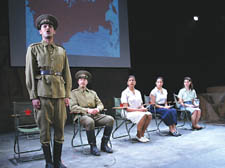|
|
 |
| |
Country where history repeats itself
GREAT GAME: PART II
Tricycle Theatre
THE shadow defence secretary Dr Liam Fox, in an interview with the New Journal last week, stressed the need to stay in Afghanistan for as long as possible.
Anything less, he said, would signal “a green light to every Jihadist”.
It is not altogether surprising that Black Tulips, written by the left-wing playwright David Edgar, lays down an alternative approach to the Conservative front-bencher.
“The more troops we send,” Edgar’s Soviet Captain warns, “the more insurgents we create.”
But while the play – the first of four shorts in the second part of the Tricycle’s ambitious Afghanistan trilogy – delivers universal lessons on cycles of violence and the folly of war, it also presents a compelling argument for occupation.
The art of the Tricycle’s celebrated “tribunal” series – spanning the Scott Inquiry, Bloody Sunday, Stephen Lawrence and Guantanamo – is to present to the audience dramatised facts and allow them to make up their minds.
It is like reading a well-written hard news story – balanced and provocative.
Set in the late 1980s, newly arrived conscripts to the Soviet Army are given a presentation by their new Captain (Vincent Ebrahim).
He briefs his new recruits on “the alien and hostile land”, the shortage in weapons, equipment and their slim chances of survival. Young women, free to dress how they like and go to university, are introduced to the cadets to explain how they have been liberated by the occupying forces.
Ring any bells?
Edgar’s play focuses on an army on its knees and on the verge of pulling out of Afghanistan.
The captain has watched more than 14,000 troops die at the hands of the US-funded Mujahedin.
America’s covert alliance with the Pakistan secret service, the ISI, is the subject of the next play, Blood and Gifts.
Brilliantly told by the playwright JT Rogers, it moves the story on by showing how the Soviets were forced out of Afghanistan by the US, who then scaled back its “aid” to the militias.
The break-up of the Soviet Union all but ended any financial support for the interim government the Russians had left behind.
Warlords carved up the country and warring factions jockeyed for power in the capital.
The fallout from that is told in David Greig’s Miniskirts of Kabul and a horrifying vision of Taliban justice by Colin Teevan.
Under Nicholas Kent’s direction, the Great Game trilogy – with a total running time of eight hours – is required watching for anyone interested in what this country is doing in the Middle East.
Recommended.
Until June 14
0207 328 1000 |

|
 |
|
|
 |
|



